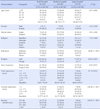Abstract
Purpose
This study was conducted to investigate and compare the characteristics and relations of nursing practice environment, professionalism and job satisfaction among nurses in general hospitals according to hospital size.
Methods
The participants included 314 staff and charge nurses who were working in the general medical/surgical nursing units in one large hospital, three medium sized hospitals, and four small hospitals. Data collected through using self-report questionnaire were analyzed using the SPSS and SAS statistical programs.
Results
Nursing practice environment and job satisfaction had significant differences according to hospital size. Both of these scales were highest for medium hospitals and lowest for small hospitals. For all hospital sizes there were positive correlations between each of the variables. Multiple regression analysis showed that both nursing practice environment and job satisfaction were affected by hospital size, but professionalism was not.
Figures and Tables
Table 2
Comparison of Nursing Practice Environment, Professionalism, and Job Satisfaction according to Hospital Size (N=314)

References
1. Aiken LH, Clarke SP, Sloane DM, Lake ET, Cheney T. Effects of hospital care environment on patient mortality and nurse outcomes. J Nurs Adm. 2008; 38:223–229. http://dx.doi.org/10.1097/01.NNA.0000312773.42352.d7.
2. Baek HC, Kim-Godwin YS. Translation and validation of Korean version of Hall's professionalism inventory. J Korean Acad Nurs Adm. 2007; 13:509–515.
3. Buerhaus PI, Donelan K, Ulrich BT, Norman L, Dittus R. Is the shortage of hospital registered nurses getting better or worse? Findings from two recent national surveys of RNs. Nurs Econ. 2005; 23:61–71.
4. Baernholdt M, Mark BA. The nurse work environment, job satisfaction and turnover rates in rural and urban nursing units. J Nurs Manag. 2009; 17:994–1001. http://dx.doi.org/10.1111/j.1365-2834.2009.01027.x.
5. Hall RH. Professionalism and bureaucratization. Am Sociol Rev. 1968; 33:92–104.
6. Han YH, Sohn IS, Park KO, Kang KH. The relationships between professionalism, job involvement, organizational commitment and turnover intention among clinical nurses. J Korean Clin Nurs Res. 2010; 16:17–31.
7. Hwang JI, Lou F, Han SS, Cao F, Kim WO, Li P. Professionalism: The major factor influencing job satisfaction among Korean and Chinese nurses. Int Nurs Rev. 2009; 56:313–318. http://dx.doi.org/10.1111/j.1466-7657.2009.00710.x.
8. Irvine DM, Evans MG. Job satisfaction and turnover among nurses: Integrating research findings across studies. Nurs Res. 1995; 44:246–253.
9. Jang IS, Park SM. A comparative study on nurses' organizational culture and job satisfaction according to the hospital size differences. Korean J Occup Health Nurs. 2011; 20:1–13.
10. Kang KN. Nurses' practice environment, nursing professionalism, career commitment, and turnover intention in the small-medium sized hospital. Seoul, Korea: Ewha Womans University;2010. Unpublished master's thesis.
11. Kim CH, Yang SS, Kim YJ, Son YJ, You MA, Song JE. A structural equation model of nurses' turnover intention. J Korean Acad Nurs Adm. 2009; 15:550–562.
12. Kim JK. A study of relationships among conflict, job satisfaction, and organizational commitment on general hospitals. J Korean Acad Nurs Adm. 2007; 13:421–430.
13. Ko HJ. Nurse work environments, job satisfaction, and intention to leave among nurses in a general hospital. Seoul, Korea: Hanyang University;2010. Unpublished master's thesis.
14. Korea Health Industry Development Institute. Hospital business analysis. Seoul: Author;2009.
15. Krebs JP, Madigan EA, Tullai-McGuinness S. The rural nurse work environment and structural empowerment. Policy Polit Nurs Pract. 2008; 9:28–39. http://dx.doi.org/10.1177/1527154408316255.
16. Kwon KJ, Chu MS, Kim JA. The impact of nursing professionalism on the nursing performance, job satisfaction and retention intention among clinical nurses. J Korean Acad Nurs Adm. 2009; 15:182–192.
17. Lake ET. Development of the practice environment scale of the nursing work index. Res Nurs Health. 2002; 25:176–188. http://dx.doi.org/10.1002/nur.10032.
18. Lee JW. Effect of nurse's professionalism on customer orientation, job satisfaction and service delivery level in specialty hospital. J Korea Contents Assoc. 2011; 11:266–276. http://dx.doi.org/10.5392/JKCA.2011.11.1.266.
19. Lee SY. The influence of job characteristics and professionalism on empowerment perceived by nurses. J Korean Acad Nurs Adm. 2006; 12:587–596.
20. Locke EA. The nature and causes of job satisfaction. In : Dunnette MD, editor. Handbook of industrial and organizational psychology. Chicago: Rand McNally;1976. p. 1297–1349.
21. Middleton S, Griffiths R, Fernandez R, Smith B. Nursing practice environment: How does one Australian hospital compare with magnet hospitals? Int J Nurs Pract. 2008; 14:366–372. http://dx.doi.org/10.1111/j.1440-172X.2008.00708.x.
22. Moon SJ, Han SS. The prediction factor on organizational commitment of the nurse. J Korean Acad Soc Nurs Educ. 2009; 15:72–80.
23. OECD/Korea Policy Centre. Health at a glance 2009: OECD indicators. Seoul: Author;2010.
24. Park SA, Yun SN. Measurement of job satisfaction of nurses and health workers in health centers. J Nurs Acad Soc. 1992; 22:316–324.
25. Snizek WE. Hall's professionalism scale: An empirical reassessment. Am Sociol Rev. 1972; 37:109–114.
26. Stamps PL, Piedmont EB, Slavitt DB, Hasse AM. Measurement of work satisfaction among health professionals. Med Care. 1978; 16:337–352.
27. Sung MH, Seo DH, Eum OB. Factors affecting low back pain in nurses in intensive care unit. J Korean Acad Fundam Nurs. 2010; 17:343–350.
28. Westerman JW, Simmons BL. The effects of work environment on the personality-performance relationship: an exploratory study. J Manag Issue. 2007; 19:288–305.
29. Wynd CA. Current factors contributing to professionalism in nursing. J Prof Nurs. 2003; 19:251–261. http://dx.doi.org/10.1016/S8755-7223 (03)00104-2.
30. Yoon JS, Kook SH, Lee HY, Shin IS, Kim AJ. Sleep pattern, job satisfaction and quality of life in nurses on rotating shift and daytime fixed work schedules. J Korean Neuropsychiatr Assoc. 1999; 38:713–722.




 PDF
PDF ePub
ePub Citation
Citation Print
Print





 XML Download
XML Download